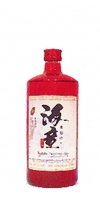Iwai (Sake)

Iwai rice is rice native to the region of Kyoto, Japan, and is only used by sake breweries. This variety cannot be purchased for use at home. In fact, the Eikun Brewery purchases roughly 40 percent of all Iwai rice grown and blends the rice with a fantastic water source in the region known as “Fusui.” Sake produced from this region blends perfectly with local cuisine and has a mild and soft flavor. Since locals do not use a lot of salt in their cooking, sake compliments the food nicely. Eikun sake is popular among fine Japanese restaurants because of its unique flavor and mild taste. The Iwai rice is a fantastic choice for this sake because it allows for deep polishing. The variety absorbs water very easily after the outer shell is shaved off. During World War II, the variety was no longer sowed due to a demand for rice varieties that produced high yields. It was not until the 1990s that the variety was planted and used for sake brewing. Rice used in sake brewing is different from rice used for food, since the rice must be able to absorb water easily. Rice used for quality sakes are twice the price of typical rice, which most breweries use for low-end sakes. Since the Iwai rice is one of the best varieties for sake, it is both expensive and not as readily available.
Rice milling: 60%
Rice varietal: Iwai (Only available in Kyoto)
Alcohol: 15%
Sake meter value: +3.0
Acidity: 1.3
Tasting Notes: --------
Eikun sake uses water from a source called "Fusui", rated as one of the top 100 sources of water in Japan. This water source is located just south of the ancient Japanese, and still cultural capital of Japan, Kyoto.
Review:
"Clear with a platinum blue cast. Aromas of coconut milk, melon, pear and rice pudding with a with a supple, dry-yet-fruity medium body and a vanilla, apple, and pepper accented finish. A robust and lively sake that will sing with spicy Asian cuisine."
- Beverage Testing Institute (July 2nd 2014), 91 pts
- back
Selected Options
Grape Types
Categories
Pricing
Countries
Regions
Grape Types
Wineries
Organic/Free Shipping
St. Supery Dollarhide Estate Cabernet Sauvignon is made from 98% Cabernet Sauvignon, 2% Petit Verdot.
This Cabernet Sauvignon presents with deep, dark reds and purples. Aromas are opulent with ripe blackberry, black plum, cassis, chocolate, and toasted oak. A rich, dense profile follows with flavors of cassis and ripe black fruits, espresso, mocha, and molasses with subtle oak in influence. It is a deep, structured wine with excellent fine-grain tannin.
Review:
100% estate-grown single vineyard Cabernet Sauvignon hails from the winery’s Dollarhide Ranch. The property is known for its steep rolling hills—reaching upwards of 1,100 feet—as well as some flatlands and seven lakes rife with wildlife. Aged for 20 months in 100% French oak (54% new), the wine offers a broad and generous mouthfeel with chewy tannins. The fruit is ripe and almost gobby, becoming more streamlined as it opens up. Dark berries are lush and sweet with hints of brown sugar. Acidity and chalky lift are well defined and have the mouth imploring for that next sip. Refined, elegant, polished, and poised
-Tasting Panels 96 Points
This 100% estate-grown single-vineyard Cabernet Sauvignon hails from the winery’s Dollarhide Ranch. The property is known for its steep rolling hills—reaching upwards of 1,100 feet—as well as some flatlands and seven lakes rife with wildlife. Aged for 20 months in 100% French oak (54% new), the wine offers a broad and generous mouthfeel with chewy tannins. The fruit is ripe and almost gobby, becoming more streamlined as it opens up. Dark berries are lush and sweet with hints of brown sugar. Acidity and chalky lift are well defined and have the mouth imploring for that next sip. Refined, elegant, polished, and poised.
-Somm Journal 96 Points
Collemattoni Rosso di Montalcino is 100% Sangiovese.
Color: intense ruby red.
Bouquet:violet flowers, black cherry and wild black fruits.
Taste: warm, dry and with good balance.
Coming from a parcel with 8-13 year old vines planted in sandy clay and marl soils.
Harvest is 100% destemmed with a soft pressing, fermentation in stainless steel tanks at controlled temperature of 28-30°C, pumping over for the first week of maceration followed by skin-contact maceration for 20-25 days with rack and return technique (delestage).
Malolactic fermentation completed.
Wine is slightly filtered before bottling.
Pairs with steak, pheasants and strong cheese.





